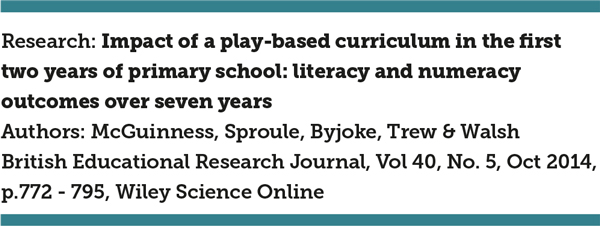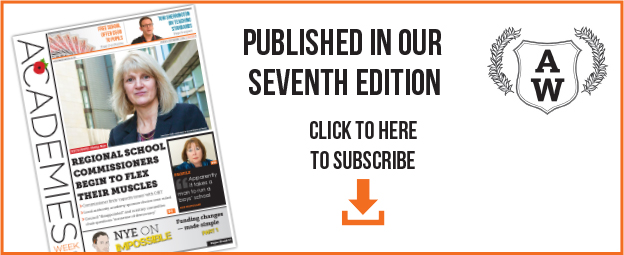
Research: Impact of a play-based curriculum in the first two years of primary school: literacy and numeracy outcomes over seven years
Authors: McGuinness, Sproule, Byjoke, Trew & Walsh
British Educational Research Journal, Vol 40, No. 5, Oct 2014, p.772 – 795, Wiley Science Online
As another national curriculum rolls out for primary and secondary pupils in England, the general direction of travel for early years pupils continues to be towards a very different experience than the formal schooling implied by the new programmes of study.
The latest edition of the early years foundation stage framework continues to emphasise that play is “essential for children’s development”.
The authors of this study set out to investigate whether a play-based approach has an effect on the longer-term success of students in reading and maths. They note that while there has been a good deal of research into play-based curricula, most has been about behavioural and social outcomes.
The investigation was not so much a randomised-control trial as a fortunately timed study that examined the introduction of a new play-based curriculum – the Enriched Curriculum – rolled out in schools in Northern Ireland in the early 2000s. It uses the cohort before the introduction of the approach as a control to compare reading and maths outcomes over the duration of primary schooling for about 2,000 pupils.
Drawing on a broadly representative range of schools from across the province, the research used the Performance Indicators in Primary Schools (PIPS) assessments to compare progress for pupils before and after the introduction of the new play-based models, and became a longitudinal study following students beyond the two years of the intervention, to the completion of primary schooling at primary 7 (age 12).
The results from the intervention period are, perhaps, unsurprising. In both reading and maths the outcomes in years 1 and 2 were substantially lower for pupils following the play-based curriculum in their first years of schooling. This reflected the delayed introduction of more formal approaches to teaching, and a period during which children focused more on emergent literacy through oral work and the development of fundamental mathematical concepts.
As might reasonably be expected, when students moved into their third year and more formal teaching of these aspects was introduced, the assessments showed a marked increase in attainment and by the fourth year (after two years of a more formal approach) the groups had reached parity.
As the report notes, this mirrors the findings from international studies comparing the outcomes for pupils who have a later start to formal schooling than in the UK, which seem to show that children soon make up for lost time. However, the longitudinal nature of the study allows comparison for the following three years too.
In the case of both subjects, the later attainment of the Enriched Curriculum cohorts failed to exceed that of the more formally-taught control group, and in most cases lagged behind.
It appears that no extra positive effect can be found for the play-based approach on reading and maths outcomes, and that perhaps a slight negative effect is evident. The authors rightly identify that other factors may be at play; however, they also suggest possible explanations for the later weaker performance of pupils. A key point is made about the security of phonic knowledge from the early years, which they note could affect performance on both maths and reading assessments for older pupils when reading forms a substantial part of tests.
I’d argue the report slightly underplays the importance of teachers’ preparedness, both for teaching through the new model, and for those teachers inheriting students who have passed through the system. Arguably, some of the shortfall for pupils following the new model might be explained by the lack of preparation provided for the teachers of pupils in years 3 and 4 to follow-up on a play-based approach. For example, if substantially less time had been spent on phonics work in the early years, was this addressed fully in the more formal teaching of older children?
Certainly, it seems the jury must remain out on the positive impact of a play-based curriculum, at least when considering the effect on academic outcomes in the core areas of reading and maths. At worst, this investigation suggests it may even be less effective than what went before.













“the lack of preparation provided for the teachers of pupils in years 3 and 4”
Says it all really. Most edu initiatives are likely to fail through lack of preparation. After all why would you expect someone to be as competent in a totally different way of doing things as they were in stuff they have been doing for years and were themselves brought up on?
Play might or might not be a good basis for curriculum change, but I doubt this type of study is ever going to do more than reinforce the status quo.